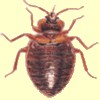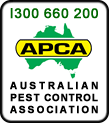|
| |
|
|
|
|
| |

|
FUMAPEST Advice on Pest Control for Bed Bugs
Bed Bugs are a serious pest problem in the Sutherland Shire region |

|
|
| |
|
|
| |
Bed Bugs are blood-suckers and are commonly found in motels, hostels or boarding houses where itinerant travellers stay overnight. Bed bugs are often found in buildings used to store second-hand furniture or clothing.
How do Bed Bugs get into bed? Bed bugs are transported with luggage, clothing and other articles, but not on the person. It is not possible to know if someone is a ‘bed bug carrier’.
Bed Bugs do bite, at night. In the morning upon waking up, you may see dots of blood in a line on bed linen. The blood has a sickly sweet odour. Also look for dried blood deposits around cracks in the bed, bed-head, flooring, bedside furniture and mattress.
Bed bugs life cycle: From the egg, the bed bug has five nymphal stages before becoming an adult. The adults and nymphs leave their harbourage area to feed every 2 to 3 days. They feed for 3 to 5 minutes at night, in the early morning hours, before returning to their harbourage area, usually located within a few metres from their feeding area. Bed bugs can survive for long periods without a blood meal.
Adverse skin reactions: Some people have an adverse skin reaction to the bite of bed bugs. The bed bug injects an anti-coagulant chemical into the bloodstream of it's host which prevents the blood from clotting. This allows the bed bug to suck out the blood until it is fully engourged.
Infection of bite area: The resulting irritancy of the anti-coagulent chemical around the bite site can be severe, particularly to people with soft sensitive skin. Scratching is difficult to resist but this can cause infection of the bite area. If this is a likely problem, you should consult a Doctor or Chemist to obtain appropriate medication. |
|
| |
|
|
| |
Pest Control for Bed Bugs
|
|
| |
|
|
| |
A professional pest controller should be engaged to ensure safe effective control of a bed bug infestation. Firstly, a thorough inspection of the area of infestation is carried out before proceeding with any insecticidal treatment or other pest control procedures. All potential daytime bed bug harbourage areas must be located and treated with the low hazard Permethrin insecticide registered for this purpose.
Remember close co-operation between the property (or maintenance manager) and the pest controller is essential. Both need to be absolutely thorough in carrying out the followng recommended procedures in order to acheive effective control.
Do NOT attempt do-it-yourself pest control using a surface spray on bed-linen or matress. Such a use could be a DANGER to the health and safety of the occupants and will most likely result in ongoing infestation.
We recommend the safer Permethrin dust or surface spray be used in all likely and observed bed bug habitat area, such as underside of base of bed, legs of bed, frame, plastic moulding around edge of matress, skirting boards, floor boards, picture rails, curtain fixtures, picture frames, light switches, power points, wardrobes, bedside tables and other gaps in furniture or fixtures and the like.
In addition, it is essential the entire room will require treatment using pyrethrum insecticide dispensed through a fogging or misting machine, in order flush the bed bugs out of their hiding areas and into contact with the Permethrin dust or surface spray.
What you can do: All clothing, bed linen, curtains, fabrics and the like must laundered prior to insecticidal treatment. Wrap mattresses in black plastic bag and place in the sun for several hours. Seal gaps in furniture, floor boards and cracks in wallpaper and other such areas where bed bugs can hide during the day light hours.
Cleanliness counts: High standards of hygiene and sanitation will certasinly help as an on-going preventive measure. The entire premises should be inspected regularly for signs of bed bug infestation. Prevention of a severe bed bug infestation throughout an entire building is more likely if regular attention is provided.
We recommend to use a professional pest controller for periodic insecticidal treatment in any commercial lodgings situation where bed bug infestations are likely to be a problem.
|
|
| |
 |
The cost of professional pest control for bed bugs using the recommended low hazard pyrethroid insecticides, will depend upon several factors, including the size of the property, the extent of infestation and ease of access to treatment areas.
Expect to pay about $540 per room in homes. Larger boarding houses, hostels and hotels at about $540 per room to achieve an effective result. Bed bug control requires extensive time, effort and expertise to solve a severe infestation. Service warranties may vary depending upon the circumstances and risk of reinfestation. |
|
| |
RING THE EXPERTS: successful pest control of bed bugs depends on many variables learnt from technical training and practical experience in a wide variety of situations.
CONSUMER NOTE: you may find cheaper prices for bed bug control in your local area, from companies using the cheaper solvent based pesticides, which we do NOT recommend, especially if residents suffer asthma or bronchial ailments.
BE CAREFUL when selecting a pest controller - it's far too easy to get a State Govt issued pest control licence and start up a pest control business, using trainees with little knowledge or experience in flea control situations .... for more details. |
|
|
|
|
|
|
|
|
 |
|
SAME FAMILY BUSINESS - Since 1964 FUMAPEST is a second generation family business. After 50 years of providing pest control services in the Sutherland Shire region, we have a valuable reputation in the marketplace and have acquired a wealth of knowledge and experience, unmatched by our competitors.
BUSINESS ENTERPRISE AWARD FUMAPEST Pest Control received a Business Enterprise Award in 1984 from the NSW Govt Office of Small Business & Qantas for our EcoSafe Pest Control system and staff training programs.
APCA Member FUMAPEST Termite & Pest Control is a member and major sponsor of the Australian Pest Control Association; we assist APCA in provision of professional advice to consumers with pest control problems; pesticide safety issues and pest control training courses available in NSW.
Industry stewardship FUMAPEST Managing Director served as a Member of NSW Govt Pest Control Licensing Board and Standards Australia Termite Control Committees AS3660 & Termite Inspection Reports AS4349. |
|
|
100% AUSTRALIAN
|
|
|
FAMILY BUSINESS
|
|
|

|
Commercial Food Handling Premises • FUMAPEST is compliant with HACCP & AQIS Requirements for commercial food handling premises • restaurants • cafes • hotels • motels • hospitals • child care centres • nursing homes • retirement villages • churches • schools • colleges• universities • race-horse stables • veterinary clinics and other sensitive environments.
Fully insured - excellent track record FUMAPEST Pest Control has public liability and professional indemnity insurance to cover claims personal injury and faulty workmanship • includes repairs for subsequent termite damage to buildings • up to $10 million and $1 million respectively • FUMAPEST has not made an insurance claim related to termite problems for more than 20 years.
Professional technicians FUMAPEST Pest Control Training Program regularly assesses technician skills in use of latest generation products • all termite control technicians have APCA or TAFE Pest Control Certificate • NSW Govt WorkCover Pest Control Licence • and many years field-work experience in termite control.
Setting the Standard in an industry many fly-by-night operators, FUMAPEST Pest Control stands out as a well established pest control business with an excellent reputation in the market-place. Be careful in selecting a pest controller it's far too easy to get a pest control licence and start up a pest control business in NSW with little knowledge or experience ... more details |
|
|
|
|
|
